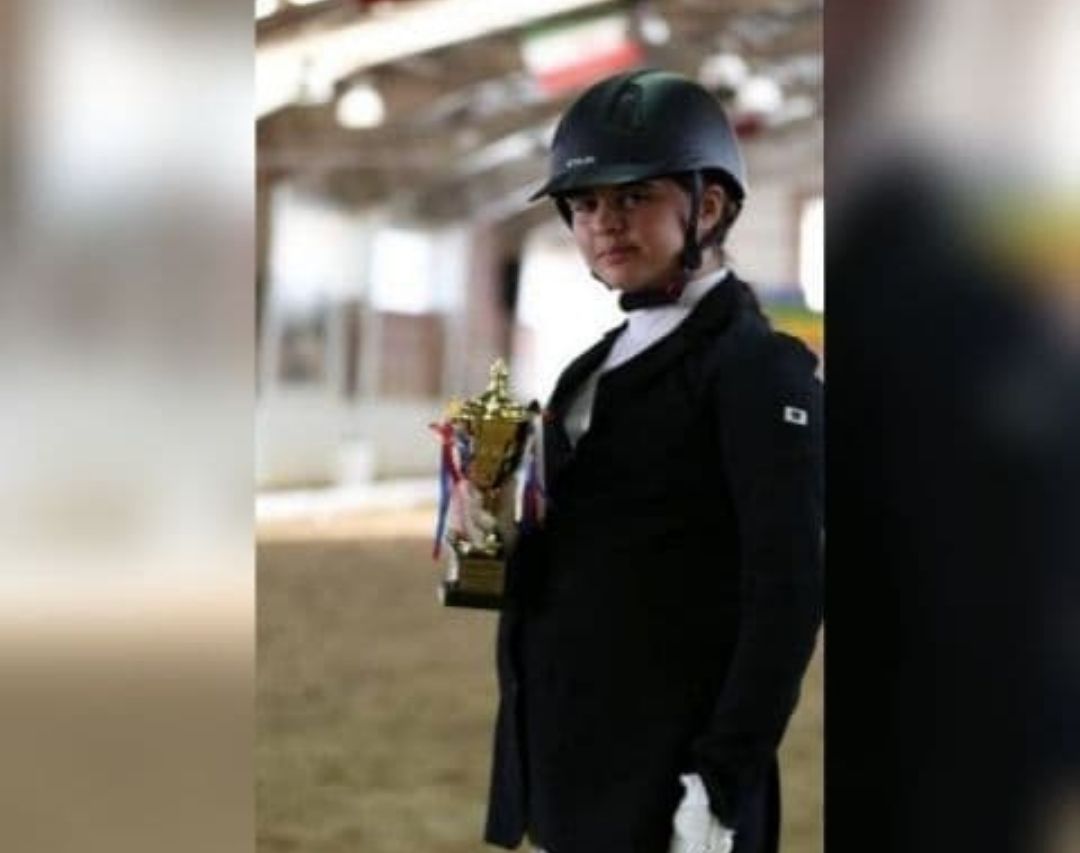Human Rights Activists News Agency (HRANA)- During the year 1401 Hijri, human rights violations continued steadfastly. HRANA reported a variety of these violation cases including:
– infringing on the freedom of expression,
– the deadly crackdown on peaceful protests,
– arbitrary harassment and prosecution of ethnic, and religious minorities, human rights defenders,
– executing juvenile offenders,
– failure to protect women and gender minorities against violence,
– prosecution of and long sentence against dual and foreign nationals,
– holding prisoners in harsh and inhuman conditions in ill-equipped prisons and detention centres,
– mistreating and torturing prisoners during interrogation,
– imposing cruel inhumane punishments such as flogging, and
– sending political prisoners to prisons in exile.
Arrests
Based on data collected from 13631 reports registered by the Statistics and Publication Center of Human Rights Activists in Iran (HRA), in the year 1401 Hijri (a period from March 21, 2022, to March 16, 2023), 29688 people were arrested for their protests, political activities, or the expression of their beliefs and opinions.
A major part of these arrests occurred during the 2022 nationwide protests known as the “woman, life, freedom” movement.
This list of detainees includes:
– 28,419 people arrested for exercising their rights to freedom of expression
– 193 minors
– 56 workers and workers’ rights activists
– 258 trade union activists
– 169 people of religious minorities
– 328 women’s rights activists
– 6 people for cultural activities
– 24 environmental activists
– 235 ethnic minorities*
*From the people listed in the category of ethnic minorities, the allegations against 192 detainees are unknown. However, considering HRA’s knowledge of the security institutions in any given area, these arrests have been included in this category.
In addition to these detainees, police/security forces arrested 34 people in blatant violation of citizens’ privacy rights to live their life as they desire without interference by the state. These people were arrested for adopting a lifestyle or holding private parties deemed unacceptable by the regime.
Sentencing
In the reporting period, the public and Revolutionary Courts across Iran opened 1075 legal cases against defendants facing political and national security charges. The Court issued a combined total of 31164 months in prison and 2507 months of suspended imprisonment. They also fined these defendants amounting to a combined total of 11,101,000,000 tomans. (approx. 227,000 USD at the time of writing)
Children
Given that in Iran, many child abuse cases are silenced by families and government institutions, the available statistics do not reflect an accurate depiction of the issue. Nonetheless, at least 25115 child abuse cases, 38 cases of sexual abuse and rape, 47 cases of juvenile homicide, 2 cases of juvenile honor killings, 3 self-immolations, 52 suicide attempts and over 20 thousand child marriages have been reported in the last Hijri year. In addition, over 5 million children dropped out of school.
The Iranian Scientific Association of Social Work (ISASW) estimates at least 30,000 children are active in the workforce. As many experts have noted, however, the real numbers are much higher. Unfortunately, there is no accurate data on the number of child laborers due to the activities of organized crime institutions and the government’s failure to tackle this issue.
Cruel Punishments
In the last year, Iran’s judicial system did not take any steps to halt “inhuman,” corporal punishments which are in blatant violation of fundamental human rights and dignity. During this year, three mutilation punishments were carried out and one other is ruled.
In addition, the courts issued a combined total of 9911 lashes. 450 lashes were carried out in the given period.
Women’s Rights
This year, women did not also witness any improvement in their rights. Aside from widespread gender discrimination and inequality in law and society, 54 reports of domestic violence were registered, and at least 39 women were murder victims of domestic violence. 11 women were beaten, assaulted and injured by the morality police or religious vigilantes imposing the so-called proper Hijab in the public. There were also registered 4 acid attacks, 8 rapes and/or sexual assaults, 8 suicides, 4 female self-immolations, and 14 honor killings.
Use of Lethal Force against Citizens
In the given period, a total of 752 citizens were shot by the regime’s military forces, of which 474 lost their lives. It includes 21 Kolbars (poor workers carrying loads on foot across national borders), 13 Sukhtbar (poor people who carry fuel illegally across the border), and 440 other civilians. 278 people were injured in unrestrained shooting by police and military forces, of the injured, 133 people were Kolbars, 12 Sukhtbar, and 133 other civilians.
Additionally, 28 Kolbars were affected by climate and geographic factors such as freezing temperatures and falling from heights. In these accidents, 26 Kolbars were injured and 2 ultimately died.
It is of note that landmine blasts took the life of at least 8 citizens and maimed 19 others during this year. Most of these landmines are the remnants of the Iran-Iraq War. The Regime still shirks its responsibility to clear these landmines, endangering the lives of its citizens living adjacent to the mine-affected areas.
Executions
As one of the world’s top executioners, Iran’s regime executed at least 617 people, increasing 80% compared to the last Hijri year. Among these executed people, 13 are women, and 6 are juvenile offenders who were under the age of 18 at the time of committing the crime. Two executions were carried out publicly.
This year, the courts sentenced 136 defendants to the death penalty, of which 6 were sentenced to be hanged publicly.
Prisoners’ Rights
Based on reports obtained by HRANA, during During the year 1401 Hijri, 123 prisoners have been victims of physical assault, 5465 prisoners were deprived of adequate medical care, 223 inmates were held in solitary confinement cells, 116 went on hunger strike as a last resort to achieve urgent demands, 169 prisoners were forcefully sent to a prison in exile, 5845 inmates were threatened or subjected to pressure, 50 inmates were denied visitation, 16 inmates died in prison by diseases, 14 inmates committed suicide, one committed self-immolation, 3 inmates were killed by prison guards/officials, 5845 prisoners were denied access to a lawyer, 5501 inmates were held in harsh and inhuman conditions, 424 prisoners were forced to make confessions, 2770 inmates were denied necessary medical furlough. In 478 cases, detainees were held in unknown places and conditions, and 1316 were held in prolonged detention in uncertainty regarding legal proceedings.
Workers’ Rights
During the given period, at least 205,687 workers were laid off or fired. 1,287 were killed and 4324 injured in workplace accidents. Moreover, 4733 workers were unjustly suspended from work, and 1,705,089 workers were without work insurance. There were also a reported 6 factory closures. In addition, at least 19,444 workers reported delays in payments, amounting to a combined 769 months’ wages.
Freedom of Peaceful Assembly and Association
In the given period, 2,825 protest rallies were held in 31 provinces, including 247 workers’ rallies, 801 union rallies, 1,352 protest gatherings against issues revolving around the suppression of freedom of expression, 43 student rallies, 10 rallies held by religious minorities, 8 rallies over women’s rights and issues, 247 held by environmental activists, and 117 held by the victims of financial frauds or other fraudulent acts. Additionally, 116 labour strikes and 398 union strikes were staged.
Concluding Note
Iran’s regime does not allow independent human rights organizations to report and collect data freely. As a result, these figures, even though alarming, reveal merely the tip of the iceberg of the human rights situation in Iran. Therefore, it is noteworthy to mention that the figures provided in this report are merely based on the reports of civil society organizations like HRANA and its Statistics and Publication Center.
For more comprehensive data and statistics, read HRANA Annual Analytical and Statistical Report on Human Rights in Iran for the year 2022. Download the full report in pdf format.



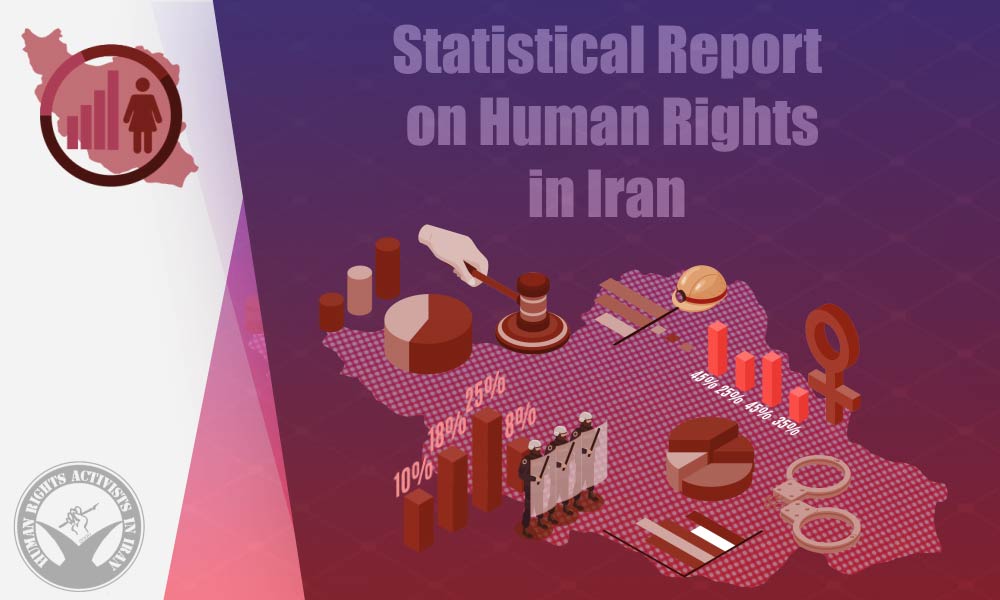

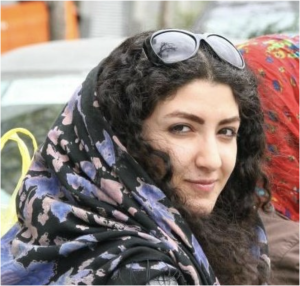 women’s rights activist Tahmineh Mofidi was arrested by IRGCS intelligence agents at her house and transferred to Ward 2-A of Evin Prison On February 2, 2021, she was released on bail of 1.5 billion tomans until the end of legal proceedings. Thereafter, Branch 26 of the Revolutionary Court of Tehran sentenced her to three years and seven months in prison and a fine of 15 million tomans on charges of “acting against national security through assembly and collusion” and “promotion of sexual perversion on social media”. Based on her refusal to appeal, as well as Article 34 of the Islamic Penal Code where only the severest punishment from multiple counts is enforceable, the verdict was reduced to a fine of 37 million tomans.
women’s rights activist Tahmineh Mofidi was arrested by IRGCS intelligence agents at her house and transferred to Ward 2-A of Evin Prison On February 2, 2021, she was released on bail of 1.5 billion tomans until the end of legal proceedings. Thereafter, Branch 26 of the Revolutionary Court of Tehran sentenced her to three years and seven months in prison and a fine of 15 million tomans on charges of “acting against national security through assembly and collusion” and “promotion of sexual perversion on social media”. Based on her refusal to appeal, as well as Article 34 of the Islamic Penal Code where only the severest punishment from multiple counts is enforceable, the verdict was reduced to a fine of 37 million tomans.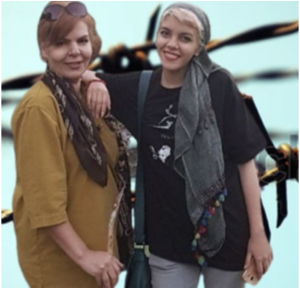 rabshahi, both civil activists and outspoken opponents of the forced veil, are currently serving sentences in Kachooie Prison in Karaj City. On April 10, 2019, one day after the arrest of her mother, Aryani was arrested and transferred to Qarchak Prison in Varamin City. They both were relocated to Evin Prison on August 13, 2019, and transferred again on October 21, 2021 to Kachooie Prison in Karaj.
rabshahi, both civil activists and outspoken opponents of the forced veil, are currently serving sentences in Kachooie Prison in Karaj City. On April 10, 2019, one day after the arrest of her mother, Aryani was arrested and transferred to Qarchak Prison in Varamin City. They both were relocated to Evin Prison on August 13, 2019, and transferred again on October 21, 2021 to Kachooie Prison in Karaj.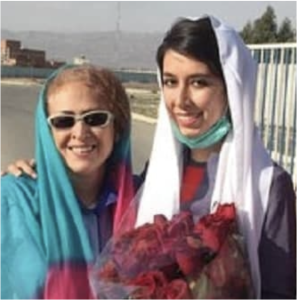 2019, respectively. On August 27, 2019, Afshari was sentenced to 15 years imprisonment on the charge of “promoting corruption and obscenity by appearing without a headscarf in public”, one year and six months on the charge of “propaganda against the regime” and seven years and six months on the charge of “assembly and collusion to act against national security”, totaling 24 years imprisonment.
2019, respectively. On August 27, 2019, Afshari was sentenced to 15 years imprisonment on the charge of “promoting corruption and obscenity by appearing without a headscarf in public”, one year and six months on the charge of “propaganda against the regime” and seven years and six months on the charge of “assembly and collusion to act against national security”, totaling 24 years imprisonment.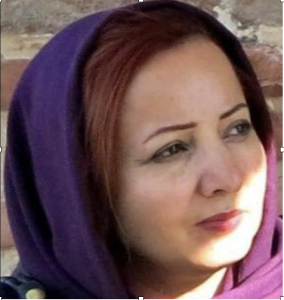 during her appearance at the Ministry of Intelligence office after phone summons. She was detained in Ward 209 at the Ministry of Intelligence’s disposal until December 19 2016, when she was released on bail of 300 million tomans until the end of legal proceedings.
during her appearance at the Ministry of Intelligence office after phone summons. She was detained in Ward 209 at the Ministry of Intelligence’s disposal until December 19 2016, when she was released on bail of 300 million tomans until the end of legal proceedings.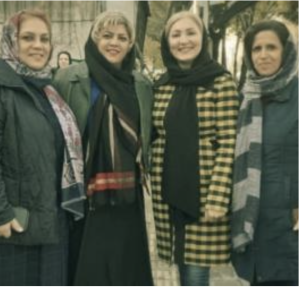 May 15, 2019, Maryam Mohammadi on July 8, 2019 and Asrin Darkaleh on July 28, 2019. They all were released on bail from May to August. Branch 24 of the Revolutionary Court of Tehran, headed by Judge Iman Afshari, sentenced the activists to a total of 16 years and 8 months imprisonment. Per Article 134 of the Islamic Penal Code, the severest punishment of three years sentence on one count was enforceable for each. This was later reduced on appeal to two years and three months each. Recently, they were summoned by the Executive Unit of Evin Courthouse to serve their sentences.
May 15, 2019, Maryam Mohammadi on July 8, 2019 and Asrin Darkaleh on July 28, 2019. They all were released on bail from May to August. Branch 24 of the Revolutionary Court of Tehran, headed by Judge Iman Afshari, sentenced the activists to a total of 16 years and 8 months imprisonment. Per Article 134 of the Islamic Penal Code, the severest punishment of three years sentence on one count was enforceable for each. This was later reduced on appeal to two years and three months each. Recently, they were summoned by the Executive Unit of Evin Courthouse to serve their sentences.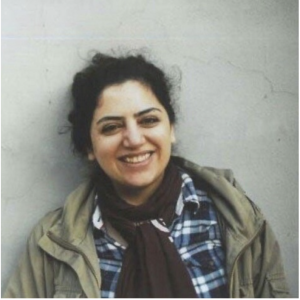
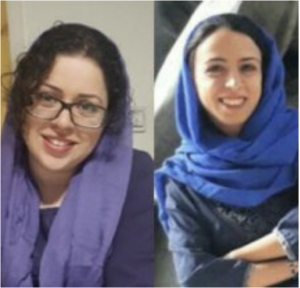 intelligence agents and then released on bail in November of that year. For the charge of “collaboration with the hostile country (U.S.) against the regime regarding women and family issues”, the Revolutionary Court of Tehran sentenced Hoda Amidi to eight years imprisonment, two years prohibiti
intelligence agents and then released on bail in November of that year. For the charge of “collaboration with the hostile country (U.S.) against the regime regarding women and family issues”, the Revolutionary Court of Tehran sentenced Hoda Amidi to eight years imprisonment, two years prohibiti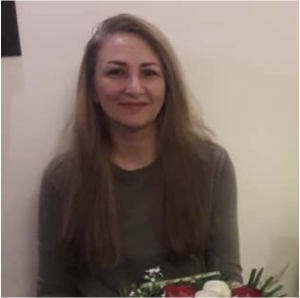 transferred to a solitary confinement cell in Ward 241 of Evin Prison at the disposal of the Judiciary’s counterintelligence. On March 6, 2019, she was released on bail of 200 million tomans until the end of legal proceedings. In May 2021, Branch 26 of the Revolutionary Court of Tehran sentenced her to four years imprisonment on the charge of “formation of a group to act against national security through registering an NGO on women empowerment”, three years in prison on the charge of “assembly and collusion to act against national security”, and one year in prison on the charge of “propaganda against the regime”.
transferred to a solitary confinement cell in Ward 241 of Evin Prison at the disposal of the Judiciary’s counterintelligence. On March 6, 2019, she was released on bail of 200 million tomans until the end of legal proceedings. In May 2021, Branch 26 of the Revolutionary Court of Tehran sentenced her to four years imprisonment on the charge of “formation of a group to act against national security through registering an NGO on women empowerment”, three years in prison on the charge of “assembly and collusion to act against national security”, and one year in prison on the charge of “propaganda against the regime”.

